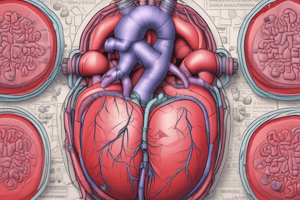Podcast
Questions and Answers
What is the mechanism of action of ACE Inhibitors?
What is the mechanism of action of ACE Inhibitors?
Inhibits Angiotensin I conversion to Angiotensin II, reducing Aldosterone secretion and therefore increasing loss of Na+ and water. Angiotensin causes vasoconstriction so these drugs result in vasodilation. Prevent bradykinin breakdown.
What is the suffix for ACE Inhibitor drugs? Give an example.
What is the suffix for ACE Inhibitor drugs? Give an example.
- -dipine
- -sartan
- -olol
- -pril (correct)
What impact can ACE Inhibitors have on the oral cavity?
What impact can ACE Inhibitors have on the oral cavity?
Xerostomia, glossitis, erythema multiforme, lichenoid reactions, loss of taste, angioedema.
What effect does Bradykinin from ACE Inhibitors have?
What effect does Bradykinin from ACE Inhibitors have?
What impact does ACE Inhibitors have on dental management?
What impact does ACE Inhibitors have on dental management?
What is the mechanism of action of Angiotensin II Receptor Antagonists (ARBs)?
What is the mechanism of action of Angiotensin II Receptor Antagonists (ARBs)?
What is the suffix for Angiotensin II Receptor Antagonist drugs? Give an example.
What is the suffix for Angiotensin II Receptor Antagonist drugs? Give an example.
What impact can Angiotensin II Receptor Antagonists have on the oral cavity?
What impact can Angiotensin II Receptor Antagonists have on the oral cavity?
What impact does Angiotensin II Receptor Antagonists have on dental management?
What impact does Angiotensin II Receptor Antagonists have on dental management?
What is the mechanism of action of B-Blockers?
What is the mechanism of action of B-Blockers?
What is the suffix for B-Blocker drugs? Give an example.
What is the suffix for B-Blocker drugs? Give an example.
What impact does B-Blockers have on oral structures and dental management?
What impact does B-Blockers have on oral structures and dental management?
What is the mechanism of action of Calcium Channel Blocker drugs?
What is the mechanism of action of Calcium Channel Blocker drugs?
Name the two classes of Calcium Channel Blockers. Give an example of each.
Name the two classes of Calcium Channel Blockers. Give an example of each.
What impact do Calcium Channel Blocker drugs have on the oral cavity and dental management?
What impact do Calcium Channel Blocker drugs have on the oral cavity and dental management?
What is the mechanism of action for Alpha-Adrenoreceptor Blockers?
What is the mechanism of action for Alpha-Adrenoreceptor Blockers?
What impact does Alpha-Adrenoreceptor Blockers have on dental management?
What impact does Alpha-Adrenoreceptor Blockers have on dental management?
What is the mechanism of action for Diuretic drugs?
What is the mechanism of action for Diuretic drugs?
What are the two classes of Diuretic drugs? Give an example of each. What would they be used to treat?
What are the two classes of Diuretic drugs? Give an example of each. What would they be used to treat?
What impact do Diuretics have on dental management?
What impact do Diuretics have on dental management?
Study Notes
ACE Inhibitors
- Mechanism of action: Inhibit conversion of Angiotensin I to Angiotensin II, reducing aldosterone secretion, leading to increased Na+ and water loss, vasodilation, and prevention of bradykinin breakdown.
- Suffix: "-pril" (Examples: Lisinopril, Captopril, Ramipril, Enalapril, Perindopril).
- Oral cavity impacts: Can cause xerostomia, glossitis, erythema multiforme, lichenoid reactions, loss of taste, and angioedema.
- Bradykinin effects: May lead to dry cough and angioedema.
- Dental management implications: Monitor platelet count due to potential bone marrow depression; can cause renal impairment and hyperkalemia when combined with Ibuprofen.
Angiotensin II Receptor Antagonists (ARBs)
- Mechanism of action: Block type I Angiotensin II receptors, lowering aldosterone secretion and promoting vasodilation through increased Na+ and water loss.
- Suffix: "-sartan" (Examples: Candesartan, Irbesartan, Losartan).
- Oral cavity impacts: Can cause taste disturbances.
- Dental management implications: NSAIDs may reduce hypotensive effects; corticosteroids and anxiolytics can also impact blood pressure.
Beta-Blockers
- Mechanism of action: Reduce renin release and sympathetic activity, thereby lowering cardiac output.
- Suffix: "-olol" (Examples: Atenolol, Propranolol, Labetolol, Metoprolol).
- Oral cavity impacts: Can lead to xerostomia, lichenoid reactions, increased tooth demineralization, perioral numbness, increased local anesthetic toxicity, and reduced Diazepam metabolism; contraindicated with Ibuprofen.
Calcium Channel Blockers
- Mechanism of action: Bind to L-type calcium channels in smooth muscle, reducing calcium entry, contractility, and cause arterial vasodilation; dihydropyridines primarily dilate peripheral vessels, whereas non-dihydropyridines decrease ventricular contraction rate and force.
- Classes: Dihydropyridines (e.g., Nifedipine, Amlodipine) and Non-dihydropyridines (e.g., Verapamil, Diltiazem).
- Oral cavity impacts: May cause gingival hyperplasia (exacerbated by poor oral hygiene), taste disturbances, increased lidocaine toxicity, prolonged sedation effects when paired with Midazolam, and unpredictable BP responses with sublingual Nifedipine.
Alpha-Adrenoreceptor Blockers
- Mechanism of action: Selective alpha-1 agonists causing vasodilation.
- Dental management implications: Risk of postural hypotension and potential thrombocytopenia.
Diuretic Drugs
- Mechanism of action: Decrease sodium resorption, increasing water loss.
- Classes: Thiazide (e.g., Bendroflumethiazide) used for hypertension and Loop (e.g., Furosemide, Bumetanide) used for heart failure.
- Dental management impacts: Information not provided but could include potential electrolyte imbalances affecting oral health.
Studying That Suits You
Use AI to generate personalized quizzes and flashcards to suit your learning preferences.
Description
Test your knowledge on cardiovascular drug classes, specifically focusing on ACE inhibitors. This quiz will cover the mechanism of action, drug suffixes, and important pharmacological details. Perfect for students in pharmacology or healthcare fields looking to enhance their understanding.




